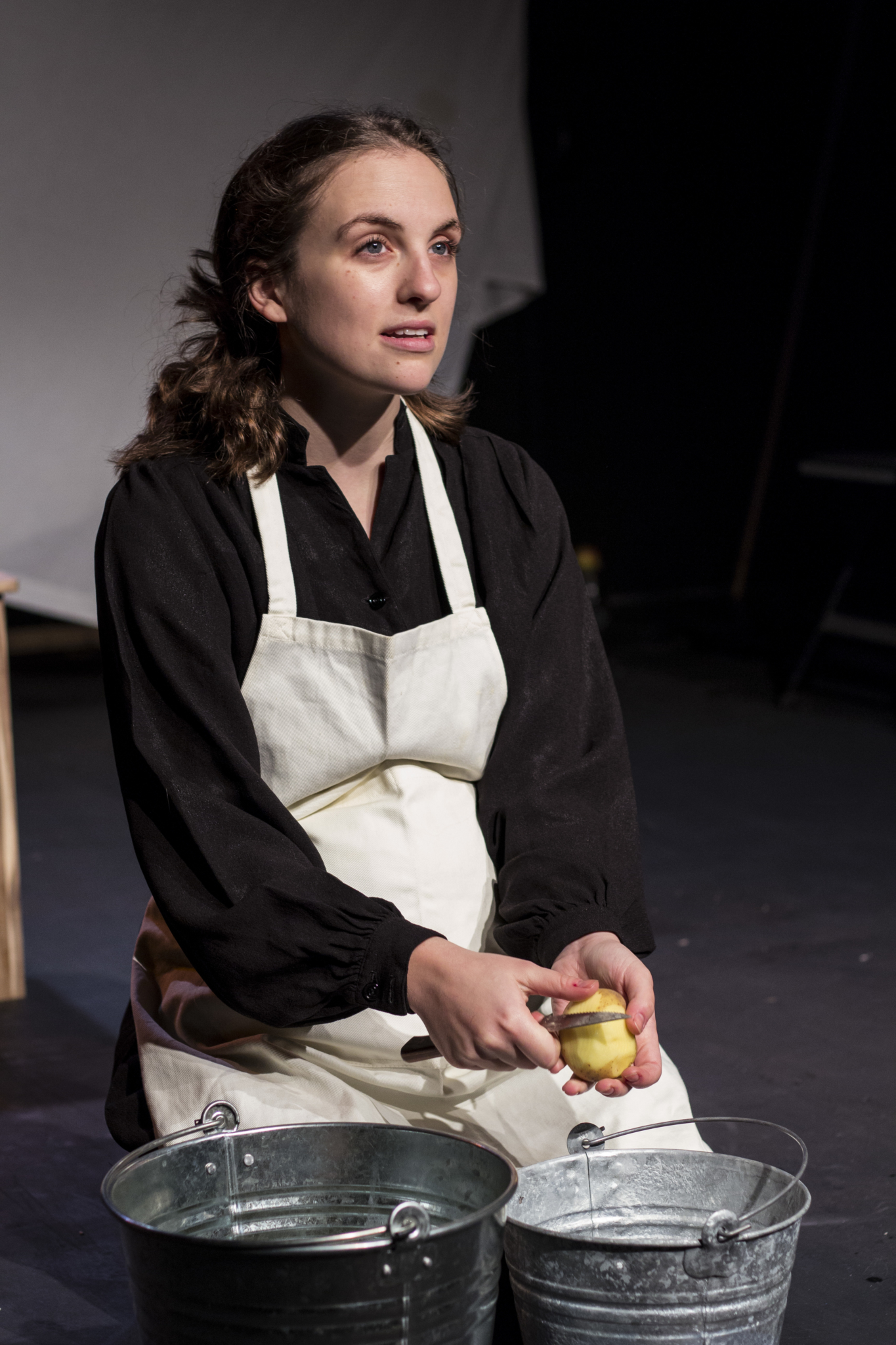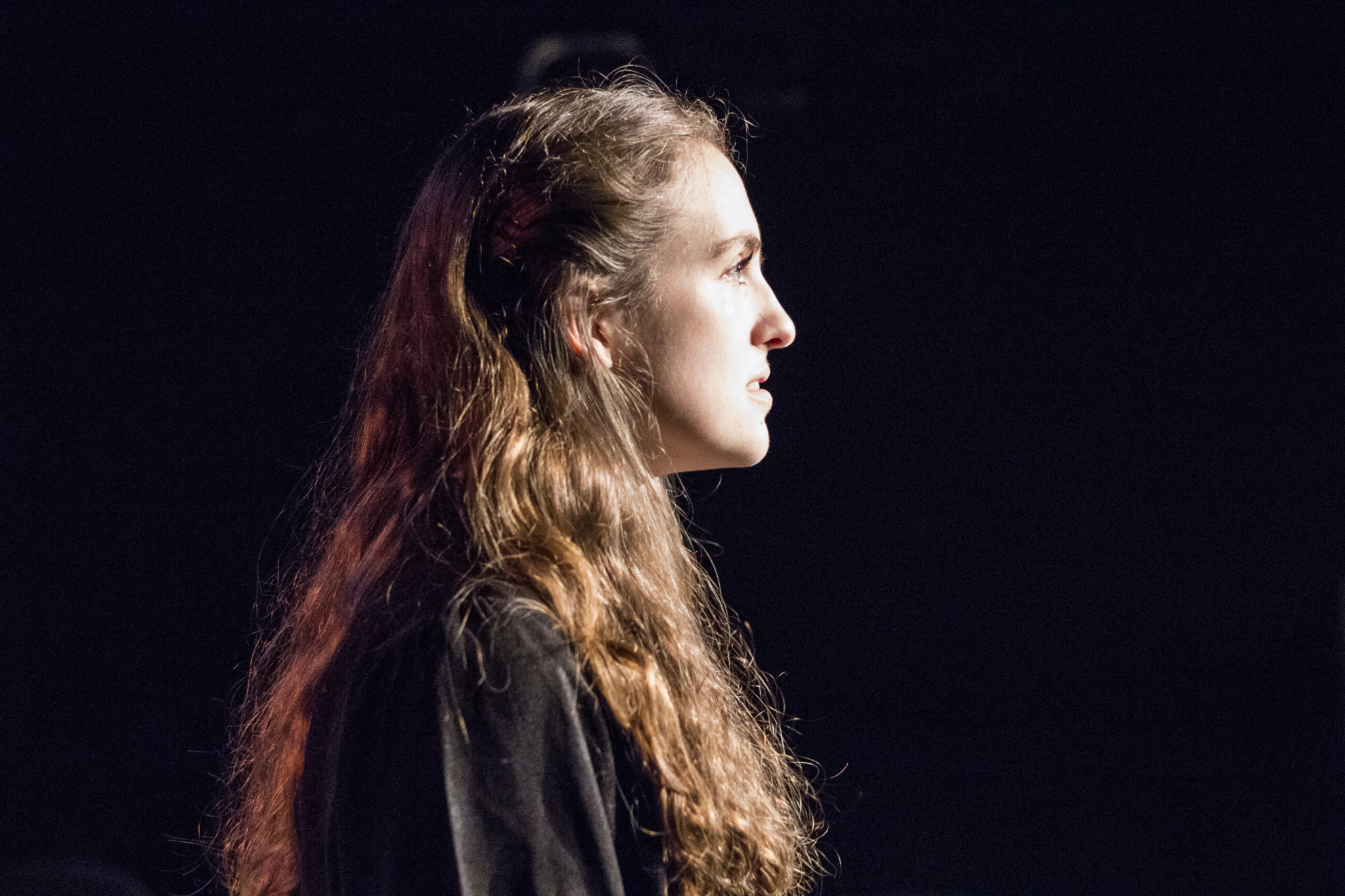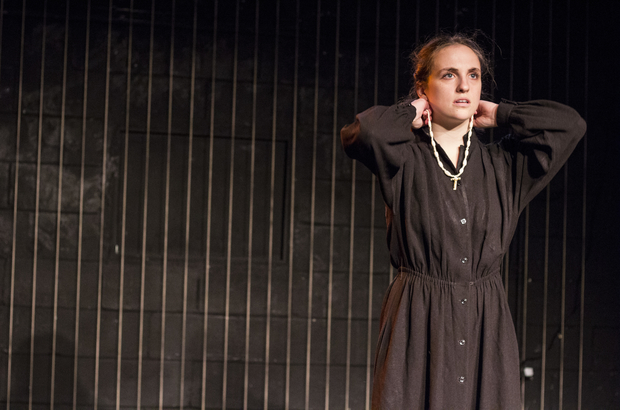SONIA CHUI reviews Dirty Laundry at Tristan Bates Theatre.
The lights dim. A bell chimes. A single woman clothed in all black walks slowly into the room, ritualistically preparing an intimate space. The play begins with a prayer followed by a confession, with a booming voice from beyond the room not encouraging, but forcing the woman to confess her sins. Dirty Laundry, performed and written by Wallis Hamilton Felton, grapples with suffering and forgiveness. Weaving in traditional Irish songs, Hamilton Felton’s protagonist unearths the decades of abuse endured in the Magdalene Laundries in Ireland, otherwise known as Magdalene’s asylums. Operating from the 18th to the late 20th centuries, these were predominantly Roman Catholic religious institutes for ‘fallen women’ who were forced to spend the remainder of their lives repenting. This term was gradually used to encompass not just prostitution but a huge number of perceived ‘sins.’ An estimated 30,000 women were confined to these institutions in the 19th and 20th centuries alone, but many more records have been suppressed or do not exist. The play’s intimate atmosphere, along with the switching back and forth between narration and internal monologue, allows the audience to empathise with the protagonist. The audience too feel her rage and sadness at such a large-scale level of suffering.
In this one-woman-show, Hamilton Felton’s protagonist is both a character and a narrator, retelling her own story while ventriloquizing other characters. Although the protagonist details her life story with the utmost meticulousness, her character is unnamed. She represents every woman, allowing her suffering to be represented as both individual and universal. Right after the sombre confession at the beginning, the lights brighten and the protagonist quickly removes her shawl which uncovers her heavily pregnant body, revealing a mirthful and loquacious girl. The sudden change of scene is deliberate but jarring, to the credit of director Jessica Reed, as the audience sees the protagonist’s once cheerful naivety quickly quashed into disillusionment, gaining insight into her desire for freedom.

The protagonist deems the institute to be the locus of ‘human slavery and entrapment.’ When her act of adultery can no longer be hidden, she is coerced into the Magdalene Laundries. Nowhere is her sorrow more emotionally penetrating than when her family abandons her: she screams for help as she is dragged to a bus, unable to receive any parting words of solace. Later, using props such as laundry lines and potato peelers, while singing songs memorialising dead women and children, the play makes it clear that the protagonist is forced into domestic submission at both a symbolic and literal level.
Making use of the intimate theatre space, the heavy interaction with the audience allows us to empathise with the character. In one scene, the protagonist ventriloquises the matriarchal Mother Reverent, who sternly asks for the audience’s names just as she had asked the protagonist during her first encounter. There is an added level of complexity too when the oppressors are also women. It is ironically a Father figure who forgives the protagonist’s ‘sin’, telling her to cherish the Holy Spirit inside her. The lighter-hearted parts of the play are brought out by the mischief caused by friendships that survive the suffering. It is her friendship with Moira that ‘brought out the fighter in me’, the protagonist declares. This faith in sisterhood is embodied by the fact that the shamed women and their children are the only names that are dropped in the play. It is clear that she finds comfort in sisterhood rather than in God.

As Hamilton Felton’s protagonist endures more suffering over the course of the play, her remarks on God become increasingly thought provoking. In the confession scene at the beginning of the play, which later turns out to occur twenty-seven years after her entry into the Magdalene Laundries, she asks in relation to following God: ‘[w]hat if it’s all wrong?’ The unforgiving and judgmental representation of God shows her lost faith. In the dramatic onscreen delivery of the baby, the overhead voice of God booms ‘sinner’, ‘whore’, ‘filth’ over and over again. It is ironic that Magdalene Laundries is named after Mary Magdalene, a ‘fallen’ woman who was later forgiven by God. The backdrop is also filled with strong messages: on closer inspection one can see statements such as ‘[b]e tough grow a vagina’ imprinted on the backdrop. The play ends with the protagonist revealing the tragedy of the mass graves of women and children found near the religious site. She declares ‘you were there too.’ Although the agency of ‘you’ is ambiguous, Hamilton Felton implies that not only were bystanders complicit in this crime, but so was God.
The play is not without fault. At times the pace of the drama feels uneven, with the narrative driving too quickly towards the end. Furthermore, the integration of traditional songs in the narrative occasionally feels contrived. However, the emotional intensity with which Hamilton Felton imbues her character was captivating. It feels exhilarating to follow her journey, allowing the audience to salute her fortitude in breaking the trail for other women. Dirty Laundry portrays an important story which not only memorialises those who suffered: Hamilton Felton gives a voice to those who were stripped of their rights, to those who were unheard all these years.
Dirty Laundry runs until the 8th December as part of Maiden Speech Festival at Tristan Bates Theatre. Find more information here.
Featured image courtesy of Lexi Clare Productions.





